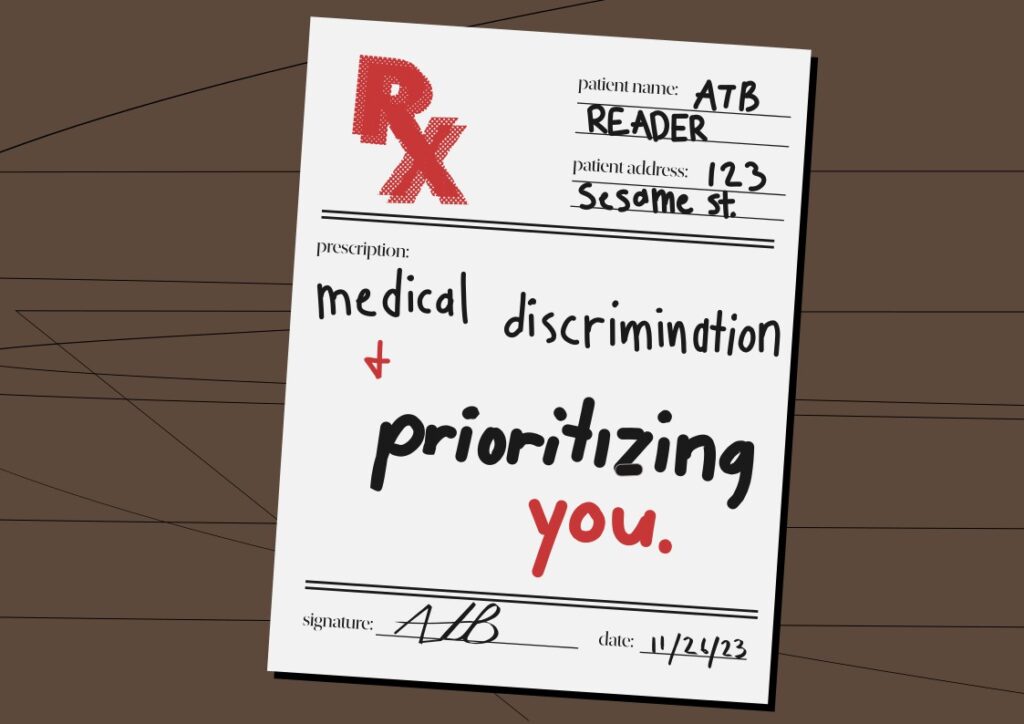Throughout history, black people, particularly women, have been heavily discriminated against when receiving medical care in the US. This is not necessarily an issue that a single person could fix, as it goes much deeper than an individual doctor, or even hospital, but rather the medical education system at large.
It is important to notice the signs of this kind of discrimination when you have a concern about your health because sometimes your doctor may be unaware of the way something may affect a black person. But most crucially it is because your health and well-being are more valuable than an oversight due to biases.
In this article, we will discuss cases where black people were treated based on a different protocol in comparison to others with similar symptoms, and then we will talk about how to properly advocate for yourself at the doctor’s office.
Pain
Black people have historically been treated as a medical “other” when it comes to treatment plans. Doctors have previously, and in many cases currently, had biases regarding race that affected the way they decided to help a patient.
Some of these biases may cause them to over prescribe medication for white people, while under prescribing Black people for the same ailments.
Not only could these biases cause discrepancies in prescription of medication, but also in the administering of regional anesthetics.
A man by the name of J. Marion Sims who was titled “The father of modern gynecology” created the first version of the vaginal speculum and helped in other birth related medical advancements. He experimented on pregnant enslaved black women repeatedly without anesthetic. This further encouraged the idea that black women experience less pain.
Myths
These biases are often not just one person’s perspective, but rather a combined idea formed from misinformation, occasionally in a professional context.
In a 2016 study published in the Proceedings of the National Academies of Science, it was found that 40% of 1st and 2nd year med students agreed with the statement “black people’s skin is thicker than white people’s.”
False information such as this being widespread in the medical world can lead to the mistreatment of black patients as previously mentioned, and dangerous accidents with life threatening consequences.
Advocating
This all may be overwhelming and rightfully so, however, it is crucial that black women are able to properly advocate for their health when at the doctors’ office.
Knowing your rights as a patient may make it easier to recognize when they are being violated. Once doing so, if you would like something to be done about it, take it up with your state’s department of health.
In the American healthcare system, your legal rights are as follows:
-
- The right to be treated with respect
-
- The right to obtain your medical records
-
- The right to privacy of your medical records
-
- The right to make a treatment choice
-
- The right to informed consent
-
- The right to refuse treatment
-
- The right to make decisions about end-of-life care
Researching family medical history and other pieces of your identity relating to health can help detect in the early stages or even prevent a health issue from arising. Create lists of anything you’re concerned about, and any questions you have so you can easily share them with your doctor.
Make sure your doctor knows how you’re feeling at the moment. Although it is no excuse, oftentimes the biases doctors have are completely implicit or subconscious, and they don’t notice how they project it upon you. Letting your doctor know if you are concerned, or uncomfortable, or feeling unheard is important to snap them out of generalizing you and putting you in a group, but rather lets them be reminded that you are also an individual, whose symptoms may vary but are still valid. If you wish to report a doctor for their conduct, you can ask another professional in the office where to go with feedback.
And finally, do not be afraid to get a second opinion, or even a new doctor entirely. You do not have to stay with a doctor if they make you uncomfortable, make you feel unheard, or even if you just don’t think you’re a good match. Your health should be your priority and your doctor’s. If you feel as though it isn’t your doctor’s priority for whatever reason, try to find one who does prioritize it.



